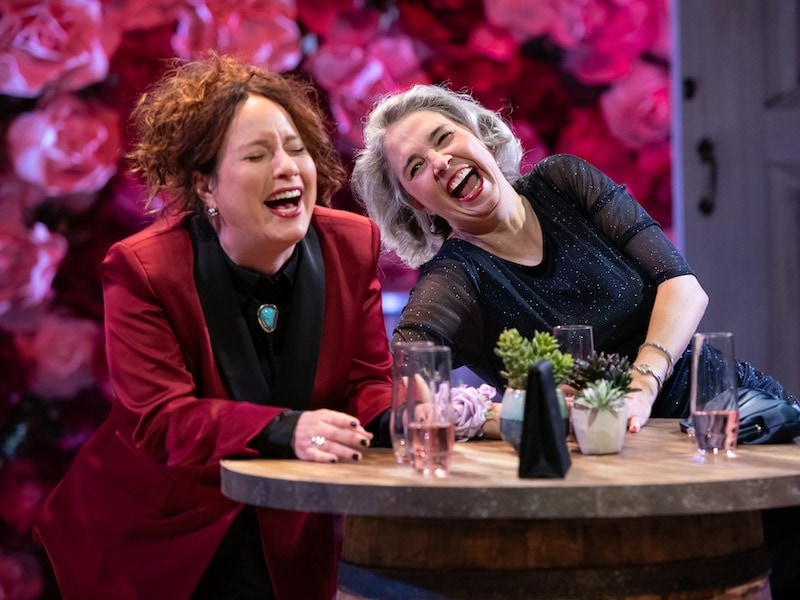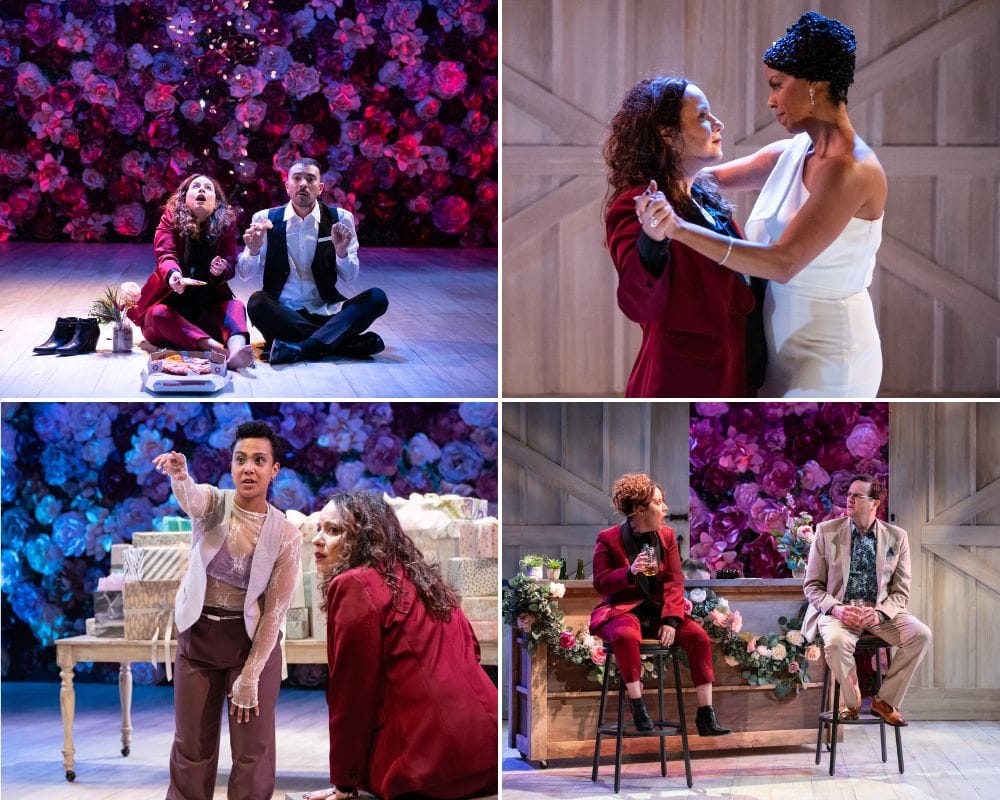By the time the cater-waiter steps onto the stage juggling a hulking, teetering wedding cake in Studio Theatre’s production of At the Wedding, the ultimate matrimonial indignity of a ruined cake seems damn near inevitable. After all, up until this point, playwright Bryna Turner has lobbed out one old wedding-story chestnut after another like bridal bouquets: drunk mother, meddling ex, aggrieved bridesmaid. But in that moment, when its beautifully frosted tiers seemed destined for dancefloor disaster, the cake steadies, making a clean exit and offering a refreshing reprieve from the plot twists and laugh-a-minute dialogue that make up the bulk of Turner’s play.
And in many ways, At the Wedding, directed by Tom Story and running through April 21, is very much like a time-honored wedding cake. No matter the frills or the flavors, the toppers or the tiers, at the end of the night, they all kind of taste the same. But in Turner’s lampooning and reimagining of such classic wedding-genre stories, they add a delicious dash of queer spice that freshens up the familiar just enough to make this wedding one to remember.

At the top of At the Wedding, we find Carlo (Dina Thomas, excellent) at the kids’ table warning the tweens and toddlers of what’s to come post-puberty: they’ll fall in love, it will be the best feeling they’ve ever experienced, and suddenly, realizing the love has ended, they’ll want to die. Carlo, she assures us, is speaking from experience — this is her ex-girlfriend’s big day (and a hetero wedding, at that). Having failed to RSVP, Carlo has come anyway, determined to have a good time and, if all goes well, win back Eva, the bride (Yesenia Iglesias, lovely). Over the course of the night, she encounters a cast of stock characters and, as you could probably guess, chaos ensues.
In riffing on wedding-day rom-coms, Turner at once seems to be skewering the genre, while also showing their love for it. While such stories are notoriously frothy, it appears that Turner attempts to avoid treading into that territory by injecting a heavy-handed lesson to give the play some weight. As such, Samuel Taylor Coleridge’s The Rime of the Ancient Mariner becomes a recurring motif throughout the play (at one point cater-waiter Victor, a magnetic Jonathan Atkinson, hisses the poem’s most famous line at Carlo). Turner utilizes the poem to underscore Carlo’s emotional journey toward letting go of the lost love. But in weaving such a heady literary throughline (albeit with a delicate treatment) amongst the silliness of the plot, it all begins to feel like icing.
But that doesn’t take away from the fact that the play is wickedly funny and, as a result, awfully entertaining. Situated somewhere between Fran Lebowitz and Radclyffe Hall, Carlo, especially in Thomas’ interpretation, is an irresistible character. Even in her razor-sharp wit and acidic sarcasm, the audience never loses the sense that Carlo is on the verge of total destruction. Thomas delivers a person who knows exactly who she is, but nevertheless suffers from a crisis of belonging: who is she without the one she loves? While it would be so easy (and dramatically deadly) to ham it up with indulgent physical comedy, Thomas resists the urge, letting the text flow naturally and creating a steady rhythm that allows the rest of the ensemble to shine along with her.
As Maria, the bride’s insecure mother, Holly Twyford plays an ultra-convincing (and excitingly unpredictable) drunk. Emily Kester’s Carly, the third-position bridesmaid who had expected maid-of-honor status, is delightful to watch as her stiff upper lip begins to quiver after a few glasses of rosé. And as Eli and Leigh, respectively, Jamie Smithson and Cameron Silliman offer admirable, straightforward performances that ground the play into a much-needed degree of reality.

And in the era of barn weddings, set designer Luciana Stecconi’s realistic dusty-rose-and-distressed-wood treatment of Studio’s Milton Theatre feels ripped right out of Northern California, where the play is set (or at least out of Lancaster County, where this critic has attended far too many poorly ventilated farm weddings). When the barn doors finally open to reveal a wall covered in huge blooms, one feels surrounded by a veritable Pinterest board, as off-whites and pink shades evoke the lushness of a springtime ceremony. Lighting designer Mary Louise Geiger punctuates Stecconi’s set with whimsical overhead string lights and adorable Mason jar luminaries that double as footlights. Costume designer Danielle Preston puts Carlo in a striking maroon tuxedo, while perfectly matching the remaining characters to their likely wedding attire: a conservative but elegant navy gown for Maria; an easily replicable lavender silk floor-length dress for bridesmaid Carly; and a fantastically gussied-up walking cast for the injured bride, matching flowers and all. To top it off, Jane Shaw’s sound design amounts to a virtual “Now That’s What I Call… Wedding Music” CD, dutifully hitting all the reception classics, from “The Cupid Shuffle” to Robyn’s “Dancing On My Own.”
Working cohesively with all of the design elements, Story leans on occasional moments of slapstick levity to temper Carlo’s carousel of sardonic exchanges with the rest of the ensemble. Story, who himself has been seen across DC stages in countless comedic roles, also underscores Turner’s earnestness at critical moments by inserting brief dance breaks that amplify the festive nature of wedding celebrations and pull the audience back from getting too deep into Carlo’s sadness. He makes excellent use of the space (with the assistance of Deb Thomas’ large, stylish props, including a beautiful gift table), conjuring distinct locales, despite minimal set changes and the snugness of the space.
No, At the Wedding doesn’t have Wagner’s “Bridal Chorus” or Pachelbel’s “Canon in D.” You won’t hear Shakespeare’s Sonnet 166 or 1 Corinthians 13:4-8. And you’ll have to prepare your own toast at the lobby bar. But even without these hallmarks of American weddings, Turner’s loving take on so many wedding conventions feels at once old, new, borrowed, and at least for Carlo, a tiny bit blue.
Running Time: 75 minutes with no intermission.
EXTENDED: At the Wedding plays through April 28, 2024, in the Milton Theatre at Studio Theatre, 1501 14th Street NW, Washington, DC. For tickets ($49–$95, with low-cost options and discounts available), go online or call the box office at 202-332-3300.
The program for At the Wedding is online here.
COVID Safety: All performances are mask recommended. Studio Theatre’s complete Health and Safety protocols are here.




